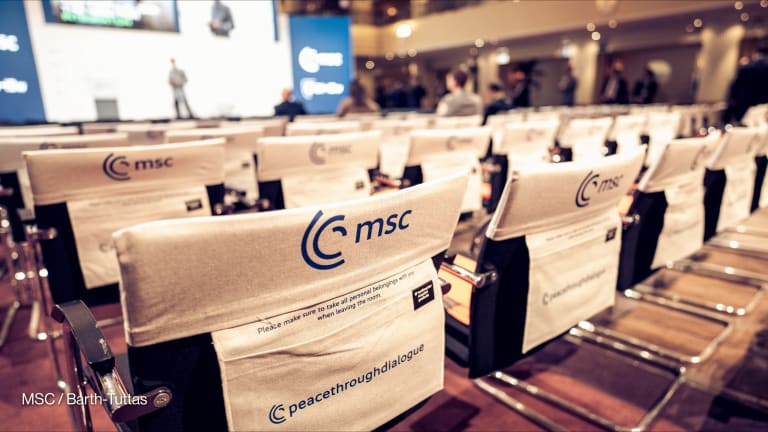
CANBERRA — The theme for the 2019 Australian Council for International Development conference, held in Sydney last week, was looking beyond aid to champion sustainable development cooperation.
The Indo-Pacific was a regional focus for many of the NGOs in attendance, who listened to development leaders from the Pacific for insight into their needs from the development community.
The message was clear: they needed to be listened to and provided a seat at the table with decision-makers.
“I'm quite fed up with talk about building capacity with no funding, [or] programs to back it up."
— Serena Sasingian, CEO, Digicel PNG Foundation“In conversations about the SDGs, we need to remember Pacific civil society and churches have been doing this stuff for more than 60 years,” Reverend James Bhagwan, general secretary of the Pacific Conference of Churches, told the audience.
Building a space for decision-makers
Serena Sasingian, CEO of Digicel PNG Foundation, told the audience she was "fed-up" with the status quo of aid and development funding and suggested that western donors and development organizations were reliant on the existing models of development.
"What if we did get ourselves free [of aid]?” she asked the audience. “Like really free? Where would that leave you? More importantly, where would that leave us?"
More on aid in the Pacific
► Q&A: 'Tuvalus will never sacrifice our principles for a few million': former PM Enele Sopoaga
Building the space for greater Pacific ownership of their development and future means moving from the traditional donor-recipient relationship and Western approaches to development.
"Listening isn't about listening to our cries and our problems, but also listening to our innovations, our solutions,” Bhagwan told the audience. “There are different models of development, and we can offer those."
Bhagwan suggested that the Western model of development had overlooked important aspects of Pacific culture — including the spiritual context of life. And bringing the Pacific to the table would require a shift in the idea of what it meant to plan and deliver development outcomes for this region.
Emeline Siale Ilolahia, executive director of the Pacific Islands Association of Non-Government Organisation, told the audience this was important to forge deeper, more equal, and respectful relationships with the Pacific. She called on Australian NGO leaders to put their words into action and join her in discussing issues in the region.
Bhagwan made a stronger call, saying he expected to see Pacific leaders on the boards of NGOs to help with building strategies that were sustainable for Pacific needs.
“Deep listening is what we are asking for — and it’s about having that space to constantly engage,” he told Devex. “Speaking at ACFID is good, but bringing Pacific voices to decision-making and governance bodies of these organizations, and having Pacific people sit on their boards is where we will see change.”
“The key thing is understanding the value system in the Pacific as opposed to Western countries — and just because it’s different that does not mean it is bad.”
— Rev. James Bhagwan, general secretary, Pacific Conference of ChurchesShifting approaches to development
In Papua New Guinea, Sasingian said that the country was falling “ way behind” in ensuring youth have a sustainable future — and in her opinion the future was not in aid but trade, requiring a focus on providing opportunities through education.
“We won't be able to take back our country if people can't read and write,” she said. “We have to look at aid not as non-stop, but in phases. I'm quite fed up with talk about building capacity with no funding, [or] programs to back it up."
Seeing the value in an educated PNG would create vast opportunities and sustainable futures. Creating a strong future for youth was tied with the cultural values of the Pacific — values linked to family, community, culture, and connection to the land. Ensuring these values were at the forefront of planning and development in the region, Bhagwan said, would create sustainable outcomes.
But in the Pacific, there is a perception that development is part of a Western, imperialist model and uses approaches that do not consider this local context, he said.
“It is this narrative that we know better and that it needs to be done our way or it won’t work,” he said. “This means there is not taking into account what can be done by the Pacific way of doing things or what Pacific civil society has to offer.”
For Bhagwan, the idea of economic development, promoted by many donors in the region, was an example of imperialistic ideas that were not always in line with local values and could prove to be unsustainable.
“Even the basic context of economic development for the Pacific economic development is not as much a priority as well-being because our values are different,” he said. “The key thing is understanding the value system in the Pacific as opposed to Western countries — and just because it’s different that does not mean it is bad.”
Local leadership from start to end would lead to better outcomes — from listening to issues, to understanding how their are perceived and identifying the solutions that can be offered by and within the Pacific.
“True sustainability can only be achieved if people can set their own agenda,” Sasingian said.
Search for articles
Most Read
- 1
- 2
- 3
- 4
- 5








